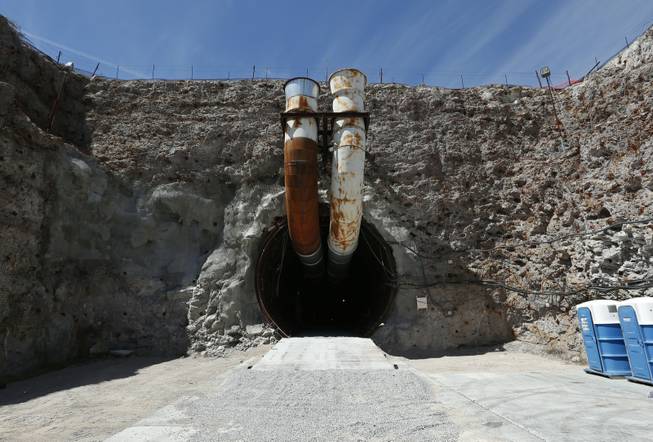
John Locher / AP
The south portal of Yucca Mountain is seen during a congressional tour Thursday, April 9, 2015, near Mercury. Several members of Congress toured the proposed radioactive waste dump 90 miles northwest of Las Vegas.
Thursday, Aug. 16, 2018 | 7 p.m.
Nevada is shoring up two positions in its opposition to the proposed Yucca Mountain nuclear waste repository that has gained steam under President Donald Trump.
The state is turning a part-time contractor position into a full-time state job and extending and boosting a legal contract as part of its decades-old effort to block the Yucca Mountain project. Momentum to create the repository all but died under former President Barack Obama.
“We honestly thought that we had won this battle over Yucca Mountain,” Bob Halstead, executive director of the governor’s Agency for Nuclear Projects, told a committee of state lawmakers Thursday. “And now we know we’re going to have to get back in the ring with them.”
The Interim Finance Committee voted Thursday to move money from state and highway funded contracts to reinstate the full-time job. The current contractor, Joseph Strolin, held the former old full-time position for more than 20 years. After the Yucca project stalled, the agency stopped requesting funding for it in favor of a part-time contractor, Halstead said after the meeting, noting that Washington, D.C., is taking renewed interest in the project.
“We now know that we’re going to not be able to get by with a half-time contractor doing essentially one-half of the administration work for the Agency for Nuclear Projects,” Halstead said.
Part of Strolin’s work entails coordinating 16 contentions against the project that have to do with transportation of the spent nuclear fuel from around the country into Nevada. If the Yucca Mountain licensing case were to ever appear before the federal Nuclear Regulatory Commission, Strolin or the person in his position would coordinate the experts who would present the state’s objections, Halstead said.
“It simply did not seem to us at that time that we were likely to be back in this situation and need this position,” Halstead said. “I fault myself more than I fault anyone else for not raising that issue.”
Lawmakers in Washington are trying to reconcile a budget bill that leaves out Yucca money in the Senate but includes the funds in the House. A decision is expected in September, with expectations that Congress will start to push for the project in January, after the midterm election, Halstead said.
The House has also passed a bill that would move the project forward, though it faces an uphill battle in the Senate, experts say. Halstead said a group of senators is working on an alternative to that bill. Legislation for consent-based repository siting has also been proposed in both the House and Senate, but neither has moved forward.
“We expect a blitzkrieg from the pro-Yucca forces in January of 2019,” Halstead said.
The first sign of work to revive the project, which the Department of Energy was essentially walking away from in 2016, was in Trump’s budget blueprint in early 2017, Halstead said. The president requested $120 million for the Department of Energy and $30 million for the Nuclear Regulatory Commission. No new funding has been approved so far, Halstead said, though he expects some key agencies to receive some allocations next year, after the fiscal year starts Oct. 1.
Strolin wants to retire when his contract runs out in December, Halstead said. Halstead said the new full-time state employee will be trained under Strolin before taking over.
Assemblywoman Maggie Carlton said she was concerned about creating a position in the interim that was previously omitted during the Legislature. The committee gave the agency the authority to convert a contractor to a state employee, and gave permission to transfer money related to the position.
“I see this being an ongoing issue, probably for at least the next couple of years during this administration, and we don’t know what’ll happen after that administration, so it will be a bit of a long-term job right now,” Carlton said. “My suggestion would be to fund it and make it classified.”
The agency was initially asking that the position be unclassified, removing some time and layers of approval in hiring, and Halstead said that was due to the expertise needed in the position, among other reasons. Halstead said that without action, the agency would be asking a half-time contractor to do the equivalent of a full-time job.
Halstead said the committee allowing his agency to reinstate the position after the fiscal year has already started is a major step. He expects to be able to start recruiting for the job in the coming days.
“This will be a classified rather than an unclassified position, which really doesn’t have any impact on how that person does their job,” Halstead said.
The state also again extended its contract with Adams Natural Resources Consulting Services, through September 2019, and increased the spending cap from $450,000 to $600,000.
Halstead told the Board of Examiners, which approved the contract Tuesday, that the agreement is necessary to continue the legal fight against Yucca mountain, and pointed to the state’s ability this year to weigh in on a Texas case that sought to push the project forward and ended up being dismissed.
The consulting company is owned by attorney Marta Adams, who helped fight the legal battle against Yucca as Nevada’s former senior deputy attorney general before she retired in 2015.
Resources approved this week go along with $3.2 million per year for the biennium approved by the 2017 Legislature for Halstead’s agency and the Attorney General’s Office to fight the Yucca Mountain project.
